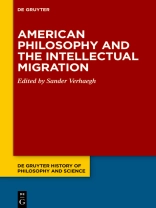How did immigrant scholars such as Rudolf Carnap, Max Horkheimer, and Alfred Schütz influence the development of American philosophy? Why was the U.S. community more receptive to logical empiricism than to critical theory or phenomenology? This volume brings together fifteen historians of philosophy to explore the impact of the intellectual migration.
In the 1930s, the rise of fascism forced dozens of philosophers to flee to the United States. Prominent logical empiricists acquired positions at prestigious U.S. universities. Critical theorists moved their Frankfurt School to Columbia University. And a group of phenomenologists taught at the New School for Social Research. Though many refugee scholars acquired some American following, logical empiricism had the biggest impact on academic philosophy. The exiled empiricists helped the country turn into a bastion of ‘analytic philosophy’ after the war. Phenomenology and critical theory became prominent schools from the 1970s onwards and continue to be influential in American philosophy today.
This is the first book to investigate to the migration from an integrated perspective, bringing together historians of American philosophy, logical empiricism, phenomenology, and critical theory.
Over de auteur
Sander Verhaegh, Tilburg University, The Netherlands.












